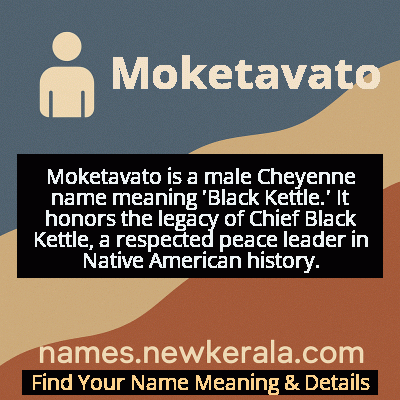Moketavato Name Meaning & Details
Origin, Popularity, Numerology Analysis & Name Meaning of Moketavato
Discover the origin, meaning, and cultural significance of the name MOKETAVATO. Delve into its historical roots and explore the lasting impact it has had on communities and traditions.
Name
Moketavato
Gender
Male
Origin
American
Lucky Number
6
Meaning of the Name - Moketavato
Moketavato is a male Cheyenne name meaning 'Black Kettle.' It honors the legacy of Chief Black Kettle, a respected peace leader in Native American history.
Moketavato - Complete Numerology Analysis
Your Numerology Number
Based on Pythagorean Numerology System
Ruling Planet
Venus
Positive Nature
Harmonious, responsible, caring, and artistic.
Negative Traits
Overly idealistic, superficial, possessive, or jealous.
Lucky Colours
Pink, turquoise.
Lucky Days
Friday.
Lucky Stones
Diamond, turquoise.
Harmony Numbers
2, 3, 9.
Best Suited Professions
Artists, musicians, teachers, healthcare workers.
What People Like About You
Warmth, nurturing nature, artistic flair.
Famous People Named Moketavato
Moketavato (Black Kettle)
Cheyenne Peace Chief
Led Southern Cheyenne during conflicts with U.S. government, known for peace advocacy despite the Sand Creek and Washita massacres
Moketavato Little Bear
Tribal Elder and Storyteller
Preserved Cheyenne oral traditions and served as cultural ambassador
Moketavato Standing Elk
Native American Rights Activist
Founded educational programs for Cheyenne youth and advocated for tribal sovereignty
Name Variations & International Equivalents
Click on blue names to explore their detailed meanings. Gray names with will be available soon.
Cultural & Historical Significance
The name carries the weight of historical memory, particularly the tragic events at Sand Creek (1864) and Washita River (1868), where Black Kettle's villages were attacked despite his efforts to maintain peace. This historical context makes the name Moketavato a powerful reminder of both the costs of conflict and the importance of pursuing peaceful resolutions. In contemporary Cheyenne communities, the name continues to honor this legacy while serving as a connection to cultural identity and historical consciousness.
Beyond its historical associations, Moketavato represents the enduring strength of Cheyenne cultural traditions and the importance of remembering both the triumphs and tragedies of indigenous history. The name serves as a living link to ancestral wisdom and the ongoing resilience of Native American communities in preserving their heritage against centuries of challenges.
Extended Personality Analysis
Individuals named Moketavato are often perceived as possessing strong leadership qualities combined with a deep sense of responsibility toward their community. They typically exhibit diplomatic skills, patience, and the ability to navigate complex situations with wisdom and foresight. The historical association with Chief Black Kettle suggests a personality that values peace and reconciliation, yet possesses the strength to stand firm in defense of principles and people.
These individuals often demonstrate remarkable resilience in the face of adversity, drawing strength from cultural traditions and historical precedents. They tend to be thoughtful decision-makers who consider multiple perspectives before acting, and they often serve as mediators in conflicts. The name carries expectations of honor, integrity, and commitment to community welfare, with those bearing it frequently developing strong connections to their cultural heritage and serving as bridges between traditional values and contemporary challenges.
People named Moketavato often exhibit a calm, steady demeanor that inspires confidence in others, combined with a protective nature toward family and community. They typically value tradition while being adaptable to changing circumstances, showing the same balance that characterized the historical Chief Black Kettle's approach to leadership. Their personality often reflects the symbolic qualities of the kettle itself - containing wisdom, providing sustenance to others, and maintaining warmth and connection within their social circles.
Modern Usage & Popularity
In contemporary times, Moketavato remains a significant name within Cheyenne and broader Native American communities, though it is relatively uncommon in mainstream American naming practices. The name is typically chosen by families seeking to honor their heritage and the historical legacy of Chief Black Kettle. Its usage reflects a conscious effort to preserve Cheyenne language and cultural identity, particularly among families actively engaged in cultural revitalization movements. While not appearing on popular baby name charts, Moketavato maintains steady usage within specific cultural contexts and serves as an important marker of indigenous identity and historical consciousness. The name has seen a slight resurgence in recent decades as part of broader movements to reclaim and celebrate Native American languages and traditions, though it remains primarily within Cheyenne and closely related tribal communities rather than being adopted broadly across American society.
Symbolic & Spiritual Meanings
Symbolically, Moketavato represents much more than its literal translation of 'black kettle.' The name embodies the concept of sustenance and community gathering, as the kettle traditionally served as a focal point for communal meals and ceremonies. It symbolizes leadership that provides for and protects the community, much as a kettle contains and distributes nourishment. The 'black' element may represent wisdom gained through experience and the ability to withstand hardship, while the kettle itself signifies containment, protection, and the sharing of resources.
The name also carries metaphorical weight as a vessel of cultural memory and historical legacy. Like a kettle that holds and preserves its contents, Moketavato represents the preservation of cultural knowledge and the transmission of traditions across generations. It symbolizes the resilience of indigenous identity despite historical challenges and the ongoing commitment to maintaining cultural integrity in contemporary society. The name serves as a reminder that true strength often lies in the capacity to nurture and sustain community rather than in aggressive confrontation, reflecting the peaceful philosophy of its most famous historical bearer.

